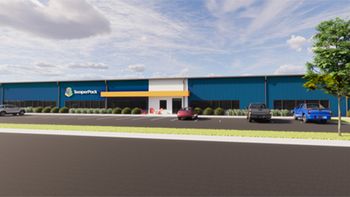
SkyCell claims 99.9% on-spec performance in cold chain shipments
The carbon footprint of shipping alternatives is also becoming a competitive issue
All cold-chain service vendors claim high performance, but Skycell, a developer of passive pallet containers primarily for air cargo, says it has the audited results to prove it. The company recently engaged with a Top 4 public accounting firm, and the finding was that for the past 12-month period, the company had 0.1% of its shipments experience a temperature excursion. There is no authoritative measure of overall industry performance in on-spec cold chain shipments, but various sources cite excursion rates from 4 to 15%--or higher when shipments to the developing world are considered.
To hear Richard Ettl, SkyCell CEO, tell it, the company’s success is due to its container technology, and its comprehensive management of shipments. For several years, SkyCell has been offering a container (in pallet, half-pallet and other sizes) that employs an aluminum shell, a proprietary “gas filled panel” for insulation, and a proprietary phase-change material. The combination provides significantly lighter weight than active air-cargo containers (which have onboard refrigeration machinery), and higher reliability than single-use pallet containers, he says. Because the high-performance insulation is relatively thin, there is more useful volume in the container.
The combination of lighter weight, more useful volume and reuse of the container translates into 35-50% reduction in the carbon footprint of the SkyCell service. (SkyCell rents its containers, rather than sell them to shippers.) “In the past year, we’re hearing more from clients who want to demonstrate an improved carbon footprint,” says Ettl.
The service component of SkyCell is also essential to SkyCell performance. The company develops standard operating procedures for the shipping lanes its clients use; this, in turn, calls for direct communications with local freight services. Onboard electronics provide a high degree of accountability for shipments; the company has digital gateways at 100 airports globally that enable automatic data reporting as shipments pass through these airports. This network is going to be expanded in 2019 with geolocation and more real-time reporting, he says.
Newsletter
Stay ahead in the life sciences industry with Pharmaceutical Commerce, the latest news, trends, and strategies in drug distribution, commercialization, and market access.




